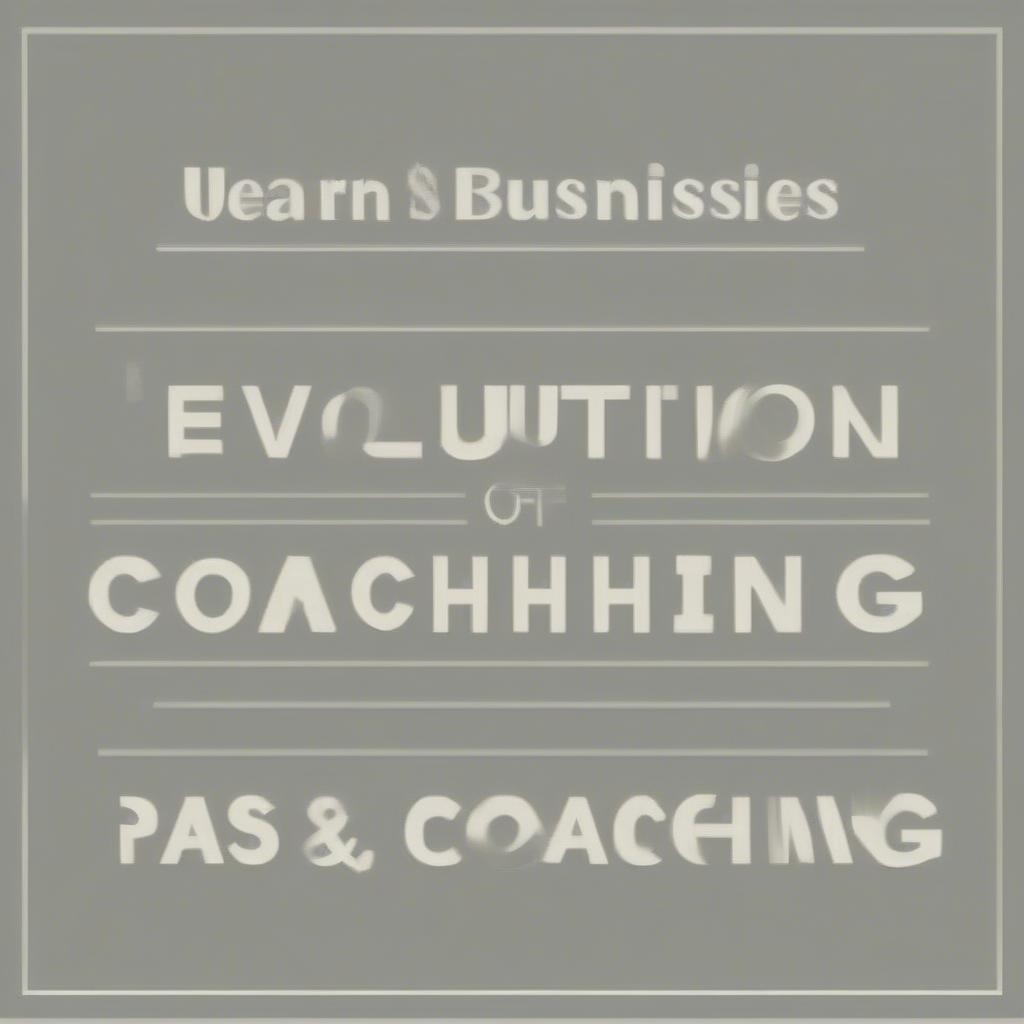
The Evolution of Coaching: Past, Present, and Future
A Journey Through Time: Understanding the Roots of Coaching
The Seeds of Guidance: Early Forms of Coaching
The concept of coaching isn’t new. Long before the term became a business buzzword, the essence of coaching existed in various forms. Think of the ancient Greek philosophers, like Socrates, who used questioning to guide their students towards self-discovery. This wasn’t coaching as we know it today, but it was fundamentally the same – helping others unlock their potential through insightful interaction. Think also of master artisans taking on apprentices, passing down skills not through lecturing, but through observation, practice, and personalized feedback. These were the seeds of coaching, planted long before the formal coaching industry blossomed.
- Ancient Wisdom: The Socratic method, emphasizing self-inquiry, laid the groundwork for many modern coaching techniques.
- Mentorship Traditions: Apprenticeships and mentorships, focusing on practical skill development, provided a model for performance-based coaching.
- Early Leadership Models: Tribal leaders and military commanders, often guiding their groups through challenging situations, used coaching principles to inspire and develop their teams.
The Rise of Modern Coaching: From Sports to Life
The mid-20th century witnessed a significant shift in the perception of coaching. While the term was initially associated with sports, the principles of goal setting, motivation, and performance enhancement were recognized as valuable in other areas. This era saw the emergence of life coaching, a field focused on helping individuals achieve their personal goals and navigate life transitions.
- Sports Psychology Influence: The study of mental performance in athletes provided a framework for understanding human potential and peak performance, leading to the development of coaching techniques that could be applied beyond the sports arena.
- Human Potential Movement: The 1960s and 70s witnessed an increased emphasis on self-improvement and personal growth, leading to a demand for coaching services that could help individuals unlock their potential.
- Early Life Coaching: Pioneers in life coaching developed methodologies for goal setting, self-awareness, and action planning, laying the foundation for the modern coaching industry.
The Present Landscape: Exploring the Modern Coaching Industry
A Diverse Spectrum: Types of Coaching Today
The modern coaching industry is a multifaceted landscape. Gone are the days when coaching was limited to sports or personal development. Today, there’s a coach for virtually every aspect of life and business. Understanding these different areas is key to grasping the scope of the current coaching market.
- Business Coaching: Focusing on improving organizational performance, leadership skills, and strategic planning. It plays a crucial role in shaping the future of companies.
- Executive Coaching: Tailored to the needs of senior leaders, helping them navigate complex challenges and enhance their effectiveness.
- Leadership Coaching: Helping individuals develop their leadership capabilities, communication skills, and emotional intelligence.
- Career Coaching: Providing guidance to individuals on career transitions, job searching, and professional development.
- Life Coaching: Helping individuals achieve personal goals, improve relationships, and navigate life changes.
- Health and Wellness Coaching: Focusing on promoting healthy lifestyles, fitness goals, and overall well-being.
- Financial Coaching: Guiding individuals towards financial stability, debt management, and investment strategies.
- Relationship Coaching: Helping individuals build stronger relationships, improve communication, and resolve conflicts.
- Specialized Niches: New niches are constantly emerging, from communication coaching to ADHD coaching, reflecting the diverse needs of individuals and organizations.
Key Trends Shaping the Coaching Industry
The coaching industry is not static; it’s constantly evolving in response to social, technological, and economic changes. Understanding current trends is essential for both coaches and individuals seeking coaching support.
- Increased Demand for Accountability: Clients are seeking coaches who can provide structure and hold them accountable for their goals.
- Focus on Measurable Outcomes: Both individual and corporate clients are increasingly demanding evidence-based coaching with tangible results.
- Integration of Technology: Online coaching platforms, virtual meetings, and digital tools are transforming the delivery and accessibility of coaching services.
- Emphasis on Emotional Intelligence: There’s a growing recognition of the importance of emotional intelligence in effective coaching and leadership.
- Rise of Niche Coaching: Specialization within the coaching industry is increasing as clients seek coaches who understand their specific needs.
- Increased Awareness of Coaching Benefits: More and more individuals and organizations are recognizing the tangible benefits of coaching for growth and development.
- Ethical Considerations: There’s an increased awareness of ethical practices, certification, and accreditation within the coaching profession.
The Power of Coaching: Why People Seek Coaching
Why do individuals and organizations invest in coaching? Understanding the core benefits is crucial to appreciate the value coaching brings to the table.
- Clarity and Direction: Coaching helps individuals gain clarity on their goals and develop a clear roadmap for achieving them.
- Improved Performance: Coaching focuses on enhancing specific skills and improving overall performance in both professional and personal areas.
- Enhanced Self-Awareness: Coaching helps individuals gain a deeper understanding of their strengths, weaknesses, and values, which is crucial for personal growth.
- Increased Confidence: Coaching empowers individuals to overcome challenges and build self-confidence.
- Accountability and Motivation: Coaching provides the structure and support individuals need to stay motivated and accountable for their actions.
- Faster Personal and Professional Development: Coaching accelerates growth and development by providing focused guidance and feedback.
- Objective Perspective: A coach offers an objective perspective, helping clients identify blind spots and overcome limiting beliefs.
- Problem-Solving and Decision-Making: Coaching equips clients with the tools and strategies to tackle complex challenges and make effective decisions.
- Support During Times of Transition: Coaching provides a valuable support system during significant life changes and career transitions.
- Stress Management: Coaching helps individuals develop coping mechanisms and strategies for managing stress and improving well-being.
Stepping into the Future: Opportunities and Innovations in Coaching
Technological Transformation: The Future of Coaching Delivery
Technology is playing an increasingly important role in shaping the future of coaching. We’re moving beyond face-to-face sessions to a more integrated and accessible landscape.
- Online Coaching Platforms: Platforms that allow for virtual meetings, document sharing, and asynchronous communication are becoming mainstream.
- AI-Powered Coaching Tools: Artificial intelligence is being used to personalize coaching programs, track progress, and provide automated feedback.
- Virtual Reality Coaching Experiences: VR technologies are creating immersive environments for practicing skills and addressing challenges.
- Mobile Coaching Apps: Mobile apps provide access to bite-sized coaching content, goal setting tools, and progress tracking.
- Data Analytics for Coaching Effectiveness: Data analysis is being used to measure the effectiveness of coaching programs and identify areas for improvement.
Evolving Coaching Methodologies: New Approaches and Techniques
The future of coaching will also be shaped by the evolution of coaching methodologies. New approaches will emerge to meet the changing needs of clients.
- Neuroscience-Based Coaching: Integrating insights from neuroscience to understand how the brain works and how to maximize human potential.
- Positive Psychology Coaching: Focusing on strengths, resilience, and well-being to empower clients to thrive.
- Mindfulness and Presence-Based Coaching: Integrating mindfulness practices into coaching to cultivate greater self-awareness and focus.
- Systems Thinking in Coaching: Recognizing the interconnectedness of different aspects of life and applying a holistic approach to coaching.
- Agile Coaching Methods: Borrowing concepts from the software development world, agile coaching emphasizes iterative feedback and continuous improvement.
- Trauma-Informed Coaching: Recognizing the impact of trauma and creating a safe and supportive coaching environment for clients who have experienced trauma.
Emerging Niches and Specializations: Responding to New Needs
The coaching industry will continue to diversify, with new niches emerging to address specific needs and challenges.
- Diversity, Equity, and Inclusion (DEI) Coaching: Helping organizations create more inclusive and equitable workplaces.
- Sustainability Coaching: Guiding individuals and organizations towards more sustainable practices.
- Innovation Coaching: Helping individuals and organizations develop creative solutions and embrace innovation.
- Technology-Specific Coaching: Focusing on helping individuals adapt to new technologies and digital environments.
- Cross-Cultural Coaching: Providing coaching that is culturally sensitive and relevant in diverse global contexts.
The Future Coach: Skills and Competencies
What will it take to be a successful coach in the future? Certain skills and competencies will become even more essential.
- Digital Literacy: Coaches must be comfortable using technology and adapting to the digital landscape.
- Emotional Intelligence: The ability to understand and respond to the emotional needs of clients will be crucial.
- Active Listening and Powerful Questioning: These core skills of coaching will remain foundational.
- Adaptability and Flexibility: Coaches must be able to adapt their approach to meet the unique needs of each client.
- Cultural Sensitivity: The ability to work effectively with individuals from diverse cultural backgrounds is essential.
- Data Literacy: Coaches must be able to interpret data and use it to track progress and measure effectiveness.
- Continuous Learning: The coaching field is constantly evolving, so continuous learning will be essential for staying relevant.
- Ethical Conduct: Coaches will need to adhere to high ethical standards and maintain client confidentiality.
Challenges and Opportunities
The future of coaching is bright, but it also faces certain challenges.
- Maintaining Quality and Standards: As the coaching industry grows, maintaining quality and ethical standards will be paramount.
- Addressing the Affordability Gap: Making coaching accessible to a wider range of individuals and organizations will be an ongoing challenge.
- Navigating the Complexity of Technology: Effectively integrating technology into coaching practices requires careful planning and implementation.
- Measuring Intangible Results: Quantifying the impact of coaching, especially on areas such as self-awareness, can be difficult.
However, these challenges also present opportunities.
- Professionalizing the Coaching Industry: Strengthening certification processes and ethical guidelines will build trust and credibility.
- Developing Affordable Coaching Options: Leveraging technology to offer scalable and affordable coaching programs can increase access.
- Leveraging Technology to Enhance Coaching: Innovation in technology will provide coaches with new tools and techniques.
- Demonstrating Impact through Data: Using data and research to demonstrate the effectiveness of coaching will strengthen its value proposition.
Learn Business: Your Partner in Growth Through Structured Guidance
How Learn Business Supports Businesses with Tailored Guidance and Templates
At Learn Business, we understand that businesses need more than just general advice. They need structured guidance, practical tools, and templates tailored to their unique challenges. We support businesses by offering a range of resources designed to enhance growth and efficiency.
- Strategic Planning Templates: We provide templates to help businesses develop clear strategic plans that align with their goals and vision. These templates cover areas such as SWOT analysis, goal setting, and action planning.
- Leadership Development Resources: We offer resources to help businesses develop effective leaders at all levels. This includes templates for performance reviews, communication training, and team building.
- Operational Efficiency Tools: We provide tools and templates to streamline operations and improve efficiency. This includes templates for project management, process mapping, and resource allocation.
- Marketing and Sales Templates: We offer resources to help businesses develop effective marketing strategies and sales processes. This includes templates for content calendars, email marketing campaigns, and sales pitches.
- Financial Management Tools: We provide tools and templates to help businesses manage their finances effectively. This includes templates for budgeting, cash flow management, and financial reporting.
Why Learn Business is a Valuable Resource for Businesses
Learn Business stands out for its commitment to providing practical, actionable guidance that businesses can implement immediately.
- Tailored Templates: Our templates are designed to be easily adaptable to the unique needs of different businesses.
- Expert-Level Guidance: Our resources are developed by experienced professionals who understand the challenges businesses face.
- Time-Saving Solutions: Our templates and tools save businesses time and resources by providing a structured approach to key processes.
- Actionable Strategies: Our guidance is focused on practical strategies that businesses can implement to achieve tangible results.
- Focus on Scalability: We provide resources that support businesses as they grow and scale their operations.
Learn Business empowers businesses to thrive by providing the structure, guidance, and practical tools they need to succeed. Our resources are designed to help businesses:
- Develop a clear strategic plan
- Build effective leadership teams
- Improve operational efficiency
- Increase sales and revenue
- Manage finances effectively
- Adapt to change and embrace growth
By leveraging Learn Business, businesses can gain a competitive edge and achieve their full potential. Our comprehensive resources help them navigate the complexities of the modern business landscape and set them up for long-term success.
Conclusion: Embracing the Ongoing Journey of Coaching
The journey of coaching from its ancient roots to its modern form is a testament to its enduring power to unlock human potential. As we look towards the future, the coaching industry will continue to evolve, driven by technological advancements, new methodologies, and the ever-changing needs of individuals and organizations. By embracing change, staying committed to quality, and continuing to innovate, we can ensure that coaching remains a powerful force for growth, development, and positive transformation. The future of coaching, like the past and present, is one of guidance, empowerment, and continuous evolution.



Leave a Reply